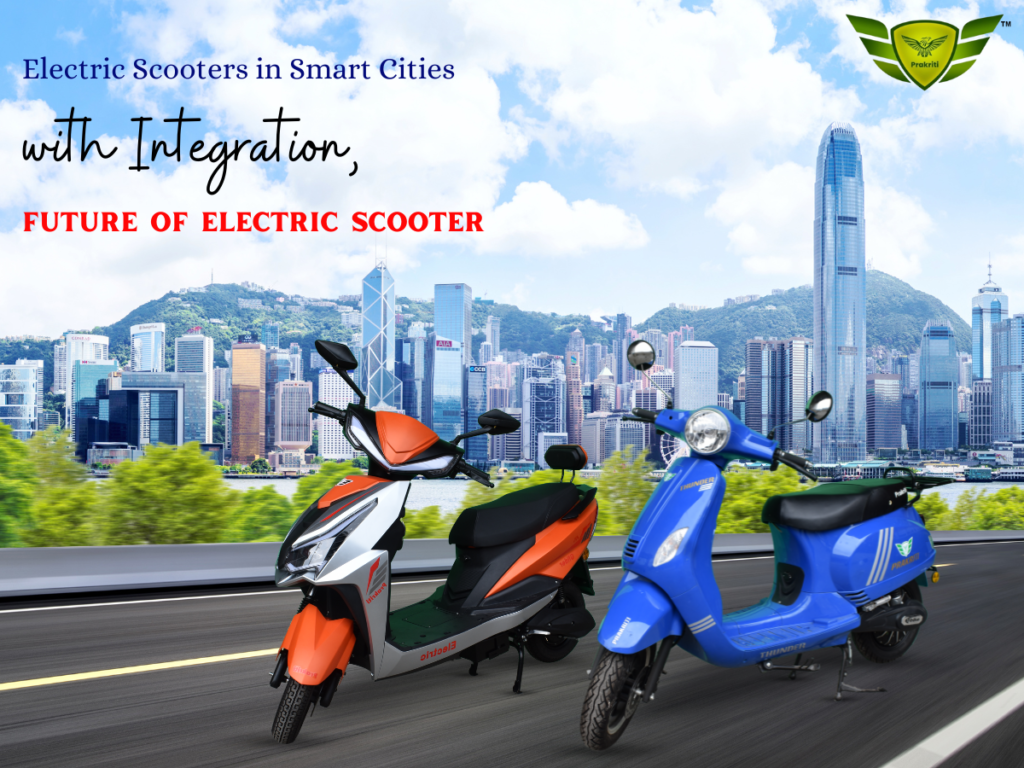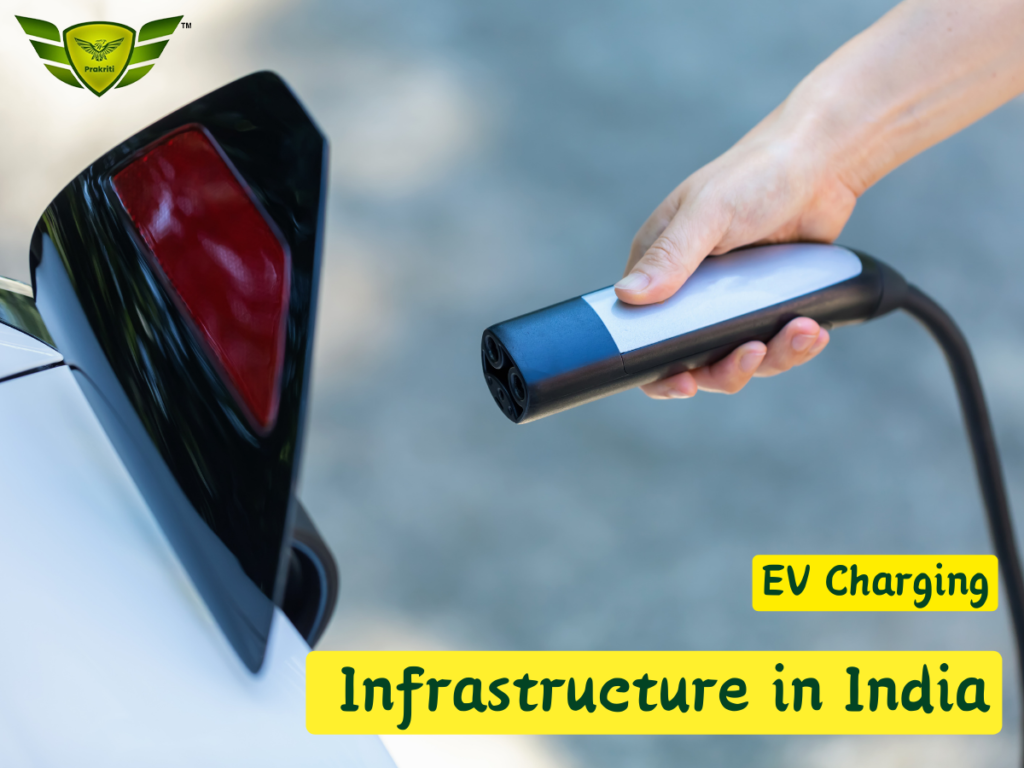How to choose best Electric scooter for ladies in India

There are differences between males and women. Furthermore, we don’t want to imply that men are from Mars and women are from Venus. Due to the variations in our bodies and physiologies, we require distinct ergonomic products. Regrettably, the most prevalent—yet least discussed—gender bias occurs in the product design industry, where women are frequently forced to utilize a pink-coloured, downsized version of a product created by men for men. For this reason, at prakriti, we honestly strove to build an elegant, sophisticated electric scooter that works for both men and women rather than producing a distinct prakriti for ladies in a pink colour. This article discusses the things to consider when purchasing a best electric scooter for ladies and explains why prakriti is the top manufacturer of electric scooters for women in India. Things to Take into Account Before Purchasing an Electric Scooter for Ladies: It took Indian culture a long time to accept that women could drive their own scooters and cars on their own, even though mobility should be a fundamental right for everyone over the age of eighteen. Furthermore, ladies may now travel around the city with even greater ease and convenience thanks to the introduction of lightweight electric scooters. On the other hand, the best electric scooter for ladies is those that mix design and functionality with a few essential characteristics. The following are things to watch out for when buying an electric scooter for women: 1.Sleek and Compact For optimal manoeuvrability, particularly in urban areas with dense traffic, a women’s electric scooter needs to be sleek and compact. When commuting, lightweight electric scooters lessen the physical strain on the body. Consequently, this lowers the likelihood of a loss of control and raises security with sleek electric scooters are more convenient to store and use whenever needed. prakriti serves the best electric scooter for ladies according to the research. 2.Range The electric scooters with the greatest mileage on a single full charge are those with a sizable range, making them ideal for women. Since lightweight electric scooters typically have longer ranges, best electric scooter of ladies can easily navigate more than sufficient for a daily commute and beyond. The scooter may be charged once every two days while still being used for errands and commuting to the office. 3. Safety Do you recall that startling figure on injuries sustained in auto accidents? Using stylish electric scooters—especially robust ones—may reduce the risk of suffering a catastrophic injury since the scooter can absorb a significant portion of the force. Additionally, the Prakriti is among the top electric scooters for ladies, particularly in terms of safety features. The dual disc brakes on the Prakriti match the vehicle’s incredible acceleration, ensuring that it stops just as cleanly as it started. It has an emergency stop signal feature that causes the tail light to blink in the event of an abrupt stop. These is the best electric scooter for ladies which have all the safety feature a scooter should have. 4. Comfort The best electric scooter for ladies is especially important because even the sleekest electric scooters may not be ergonomically appropriate for your body. Compact electric scooters, such as the Prakriti, are preferable because the handle is built at a comfortable height, allowing women to grasp the handle and throttle without stretching forward. Prakriti scooters also have the most comfortable seat on an electric scooter for women, making it simpler to maintain appropriate posture and a straight spine when riding, even on extended rides. The Prakriti’s Mon shock suspension absorbs all of the harsh bumps on city roads, so the lengthy trip does not tire the rider out. 5. Acceleration If you ever find yourself in a dangerous scenario on the road, a rapid burst of speed or power can mean the difference between safety and disaster. It is consequently critical for a best electric scooter for ladies to have a strong pick-up and swift acceleration. Like the Prakriti electric scooter, which can go from 0 to 40 km/h in 3.3 seconds with a gentle twist of the throttle. The Warp Mode on the Prakriti scooter provides a rapid burst of speed as well as incredible steadiness and balance even at high speeds of 80km/hr. 6. Storage Women tend to bring a lot of stuff with them wherever they go. So, the ideal electric scooter for ladies is one that has enough storage capacity for their handbag and other essentials. Whether it’s a business laptop, a tiny gym bag, or some shopping, everything fits snugly inside the Prakriti scooters have limited leg space to keep all the essentials. 7. Style & Aesthetics It could be the world’s most comfortable ride, but if it isn’t stylish, why bother? Today, sleek and robust electric scooters have achieved significant design breakthroughs since their initial release, and they appear sleeker and classier than ever before. Choose from a range of classic colours for your prakriti to make a good first impression. That is what you want the finest electric scooter for women to accomplish. Why Prakriti is the best Electric scooter for ladies: Women are recognized for their intuition. So, if you’ve read this far, we’re quite sure you know the answer to the question, ‘which is the best electric scooter for ladies?’ But we’ll say it anyway: The prakriti is hands down one of the best electric scooters in India for ladies. Yes, you may discover different lightweight electric scooters on the market that meet the seven criteria to examine before purchasing an electric scooter for women. However, the prakriti offers several unique characteristics that no other scooter can match, making it an essential choice for ladies searching for a stylish and durable electric scooter. Conclusion: Good-looking, sleek, eco-friendly, economically feasible, ergonomically perfect, safe, and elegant electric scooters: for ladies, the prakriti is the ideal solution to ‘what a girl wants’, at least when it comes to her ride. In a world where product design completely excludes women, prakriti has assured that
Electric Scooters and the Integration, future of electric scooter:

Electric scooter sharing has become a disruptive force in the ever-changing urban transportation sector, completely changing how we move across the streets. Future of electric scooter Not only has the incorporation of these agile and environmentally conscious cars improved convenience, but it has also caused a fundamental change in the way people view and interact with their daily commutes. This blog explores the explosive growth of electric scooter rental businesses, following their development from cutting-edge alternatives to transit to essential elements of urban life. We uncover the layers of innovation, sustainability, and social connectivity that together contribute to scooter sharing’s status as a game-changer in modern urban transportation, by analysing the complex influence of this technology on urban mobility. Executing the future of electric scooter: some of the major points of future of electric scooter will in the following step, the green future is waiting for all: Easy Accessibility at Your Fingertips: Platforms for renting out electric scooters have completely changed urban mobility by offering a last-mile, on-demand transportation option. Users can easily find, unlock, and ride future of electric scooter located all over the city with a few taps using a smartphone app. This degree of accessibility enhances the flexibility and efficiency of urban transportation systems, by streamlining the commuter experience and enabling people to make impulsive, environmentally friendly decisions. Widespread adoption has been greatly aided by the ease and speed with which electric scooters can be accessed via an intuitive app, turning sustainable commuting into an incredibly practical and accessible choice for city people on the go. Mitigating Congestion in Traffic: For short-distance commuting, future of electric scooter sharing provides a sustainable alternative as cities continue to struggle with traffic congestion. Because commuters can move through congested areas with ease, there is less traffic and carbon emissions from using traditional forms of transportation. Because they are small, electric scooter users can manoeuvre through traffic and access areas that might be inaccessible for larger cars. These scooters help to improve the flow of urban traffic and create a eco-friendlier and more productive urban environment ,by relieving the strain on clogged roads. This not only improves urban living generally but also supports international initiatives to build greener, more sustainable cities that put the health of their citizens and the environment first. Eco-Friendly with future Transportation: Electric scooters are by nature environmentally friendly because they produce no pollutants. The growing popularity of future of electric scooter sharing supports, the global movement for sustainable transportation solutions by fostering a greener urban environment and cleaner air. In addition to improving the immediate urban environment, this shift toward environmentally responsible mobility supports larger campaigns that fight climate change, and promote a more sustainable future. Innovation and Technology: Sharing electric scooters is a leading example of technological innovation. These scooters are simple to find, unlock, and ride thanks to GPS tracking, mobile app integration, and Internet of Things connectivity. The convergence of transportation and technology has enabled the development of smarter and more interconnected cities. Incorporating state-of-the-art technologies not only improves user experience but also helps build intelligent urban infrastructures. Future of Electric scooter sharing platforms facilitate effective fleet management, optimum traffic flow, and enhanced urban mobility by utilizing real-time data and connection. This technology-transportation nexus highlights how innovation may be used to solve today’s urban problems and emphasizes. how electric scooters can act as catalysts for the development of smarter, more integrated urban settings. Impact on the Community: Electric scooter rental businesses foster a feeling of community in addition to providing individual convenience. Urban dwellers are more bonded and engage in social interactions when they have shared mobility, which encourages a commitment to sustainable living. With smartphone access, future of electric scooter sharing is transforming urban mobility and offering unmatched convenience. These services are reshaping urban transportation and provide a low-carbon, traffic-congestion alternative for short commutes. Scooters are an appealing substitute because of their affordability and environmentally favourable qualities, which support worldwide sustainability initiatives. They handle first- and last-mile connection while integrating seamlessly with public transportation. Urban transportation is being redefined by technological developments like as app integration and GPS tracking. The future of electric scooter sharing looks promising, despite obstacles like safety concerns and legal barriers. It will be crucial in forming sustainable and connected cities. What changes are we seeing in the urban infrastructure? In order to handle the increase in the use of electric scooters, city councils are updating their infrastructure. This includes: Increasingly, cycle lanes are being used as a vital way to improve the effectiveness and safety of urban transportation. In order to accept e-scooters or incorporate them into the current riding infrastructure, many cities are expanding their cycle lanes. Riders benefit from smoother, safer routes as opposed to the sometimes uneven and cluttered sidewalks, and walkers gain piece of mind from not having to worry about silent, quickly moving scooters on sidewalks. This lessens obstruction in public areas and helps maintain walkways that are friendly to pedestrians. Because electric scooters are small, they eliminate the need for large parking lots, which directly and favourably affects the preservation of green spaces in urban areas. In the places where parking lots would have otherwise been, parks, trees, and other vegetation can thrive. These green areas are essential for raising residents’ general well-being, lowering the effects of urban heat islands, and improving air quality. Therefore, the transition to future of electric scooter promotes the creation of more liveable and sustainable urban environments. Conclusion: Innovative approaches to incorporating e-scooters into the larger transportation system are being tested by cities. The idea of “micro-mobility hubs,” where small electric vehicles such as e-scooters and e-bikes can be hired or parked next to public transportation stops, is one example. These hubs provide easy entry locations for a range of transportation options, facilitating people’s selection of the best option for their trip. In certain urban areas, future of electric scooter is being combined with electric bus systems, enabling users to bring their scooters on buses,
Is prakriti electric scooter is the best electric scooter for college student?

Is prakriti electric scooter is the best electric scooter for college student? <img width=”800″ height=”600″ src=”https://prakritiev.in/wp-content/uploads/2024/07/Blog-heading7-1024×768.png” alt=”best electric scooter for college student” srcset=”https://prakritiev.in/wp-content/uploads/2024/07/Blog-heading7-1024×768.png 1024w, https://prakritiev.in/wp-content/uploads/2024/07/Blog-heading7-300×225.png 300w, https://prakritiev.in/wp-content/uploads/2024/07/Blog-heading7-768×576.png 768w, https://prakritiev.in/wp-content/uploads/2024/07/Blog-heading7-600×450.png 600w, https://prakritiev.in/wp-content/uploads/2024/07/Blog-heading7.png 1200w” sizes=”(max-width: 800px) 100vw, 800px” /> The rapid global proliferation of shared e-scooters is a result of new urban mobility strategies that governments have put in place to provide accessible, reasonably priced, and flexible displacements and enhance urban well-being. This is because the use of shared services can potentially mitigate the negative effects of individual motorized transportation, such as excessive pollution, traffic congestion, and noise. Additionally, the usage of the <strong>best electric scooter for college student</strong> can supplement and replace driving, using public transportation, and engaging in active forms of transportation, making their popularity advantageous for the objectives of sustainable policy. Shared e-scooters can also help relieve traffic congestion in cities with greater rates of car ownership and use. Furthermore, this metric permits the provision of a rapid trip to and from public transportation or an increase in the distance individuals are willing to walk in order to get to and from their residences and public transportation. However, as shared e-scooters are still relatively new in urban areas, a regulatory vacuum may hinder the full potential of this micromobility choice. And here, prakriti is the best electric scooter for college student. Certain locations permit e-scooter travel on sidewalks, bicycle infrastructure, and the road; nevertheless, other locations forbid e-scooter circulation on sidewalks and pedestrian zones. Since most e-scooters are parked on sidewalks, which restricts individuals with disabilities’ access and obstructs pedestrians’ right of way, parking them can also be an issue in cities. Is the electric scooter the best mode of transportation for college student? Now that you’re a college student, while it’s an exciting time to be here, getting around might be difficult. Although riding is an option, a quicker fix is preferable. Another alternative is to take public transportation, but there’s a chance you’ll be late for class. Using the car owned by your family is another option, albeit it may cause inconvenience to your parents. Thankfully, there is a solution in the form of an electric scooter! and the best electric scooter for college student is prakriti with all new feature and extremely beautiful design. An electric vehicle is an excellent choice for college students who require a dependable mode of transportation that is both speedy and convenient. The advantages and other pertinent information are enumerated in this article. Now that you know more, you can decide wisely before investing the best electric scooter for college student!Life in college may be very busy. Between studying, taking classes, and hanging out with friends, there is never enough time. For this reason, students may find that electric scooters—like the prakriti electric scooter as prakriti electric scooter is change the game. College students can benefit from electric scooters in the following ways: Affordable electric scooter for college student: Tuition at a college or university can be exceedingly costly. Students must additionally pay for housing, food, and other school-related expenditures in addition to the tuition. Students’ budgets can be severely impacted by transportation costs, especially for those who live far from campus. An increasing number of students are utilizing shared or individual electric scooters because of their affordability and ease. Compared to regular cars, prakriti electric scooter are the best electric scooter for college scooter. Noise free and pollution free environment: Both air and noise pollution are at record levels. This benefit ought to be significant because we will be future members of the society. On the other hand, prakriti is the best electric scooter for college student that lessens noise and air pollution. The toxic fumes and toxins created by gasoline-powered scooters are eliminated by electric scooters. Electric scooters emit no pollution from their exhaust. This stops the release of harmful particles that lead to air pollution and respiratory issues, such as nitrogen oxides and carbon monoxide. Because electric scooters are so much quieter than traditional scooters, urban noise pollution is significantly reduced. Electric scooters are therefore a sustainable choice for university students. Their battery-powered system and silent operation contribute to a more peaceful and tidier atmosphere. Best electric scooter for college Convenience: Prakriti is an best electric scooter for college student, They are specifically designed with the ease of the rider in mind. The Prakriti electric scooter has exceptional manoeuvrability and agility. They are therefore ideal for gliding through crowded city streets. Prakriti electric scooters are made to make riding in urban environments easy and hassle-free. Prakriti electric scooters provide safe riding for college students, even while negotiating tight turns and traffic. Time saving: You can save time by using an electric scooter, particularly if you’re running late for class. With their speed and safety, electric scooters let you move around metropolitan streets and college campuses with ease. Because they are small, electric scooters let you use constrained alternate routes and avoid traffic. Given the general traffic in many areas, they offer a time-efficient mode of transportation that enables you to save important time and accomplish more during your academic day, prakriti electric scooter have the highest speed of all, so it is the best electric scooter for college student. Future of prakriti electric scooter: The future of the Prakriti electric scooter is the best for college student, As the industry leader in electric scooters, Prakriti Electric Scooty is pushing the boundaries of technology and setting new standards for electric two-wheelers. 1.Prakriti Electric Scooters’ electric scooters are the perfect blend of practicality, efficiency, and environmental friendliness. 2.Modern design and cutting-edge technology enhance the riding experience. Its sturdy design and dependable braking systems put safety first. 3.The Prakriti electric scooter offers eco-friendly mobility solutions to the market. 4.The goals of ongoing research and development are to improve battery performance, connection, and technology. 5. Prakriti’s commitment to quality and innovation is transforming the sector. 6.The use of Prakriti electric scooters for sustainable urban mobility by college students will be crucial.
EV Charging infrastructure in India

Home About Us Product Prakriti Defender Prakriti Neo Prakriti ESPA Prakriti Super Royal Test Ride Blogs Home About Us Product Prakriti Defender Prakriti Neo Prakriti ESPA Prakriti Super Royal Test Ride Blogs <a href=”https://forms.gle/hVFDmwD26WSCkJj99″> Dealership Enquiry </a> India’s <strong>EV charging infrastructure</strong> needs immediate attention. In order to encourage the further adoption of electric vehicles in India, a strong national charging network is essential. This is because, in addition to providing EV owners with fast and speedy vehicle charging, it will also—and maybe more importantly—allay drivers’ fears regarding their vehicles running out of gas. This is crucial since range anxiety remains the main obstacle to the widespread adoption of Venturous initiatives for EV charging infrastructure have been started by the Indian government. Most notably, incentives for EV adoption and the expansion of <strong>EV charging infrastructure</strong> are offered under the Faster Adoption and Manufacturing of (Hybrid &) Electric Vehicles (FAME) plan. By establishing the National Electric Mobility Mission Plan (NEMMP), which provides incentives for EV sales, the government has further accelerated the adoption of EVs. Nevertheless, private sector investment is necessary for these government measures to succeed in building charging infrastructure. It is not possible for the government to establish a strong and comprehensive charging network by itself. The construction of EV charging infrastructure should also involve private sector entities such as resident welfare associations (RWAs) and charging infrastructure providers. Finding India’s EV Infrastructure Obstacles: India has set a lofty goal by 2030, all forms of transportation would be electrified. India will require 46,000 EV charging infrastructure nationwide in order to reach this goal. The following illustrates India’s existing EV infrastructure situation, We examine three factors that are preventing India’s EV infrastructure from developing at the moment. Inadequate power grid: India’s increasing power consumption has already placed a great deal of strain on the power grid; it is projected to rise by 9–12% in the first half of 2023 alone. This can be made worse by adding EVs to the grid, which will lead to frequent power outages. This is particularly valid for rural regions. This lack of power has the potential to deter EV adoption by undermining the confidence of potential EV owners regarding the dependability of their vehicle’s charging. Decreased trust among consumers also deters private sector investment in EV charging infrastructure. Lack of public charging infrastructure: By 2030, nine cities will have 46,397 public charging stations constructed, according to the Bureau of Energy Efficiency (BEE). But as of the now, India only has 5, 234 charging stations dispersed throughout the country. Retail establishments, proprietors of small businesses, and RWAs can still be reluctant to offer public charging stations on their property even with government pressure. They are worried about how much capital these stations will need. They might not be aware of the advantages these stations could have for their companies. However, prospective EV owners continue to worry about the range of their cars in the interim. Geographical diversity: India is a large country with a varied geography. Different charging-related concerns are needed for its varied geography, which ranges from plains to mountains fed by rain. For instance, a portion of the infrastructure for EV charging must to be resilient to waterlogging, which happens frequently in some places four months out of the year. Furthermore, rural areas may need a whole different EV charging infrastructure than metropolitan areas due to differences in population density and travel patterns. Installing and maintaining charging stations in remote locations may be more difficult because to this enormous gap between rural and urban areas. To make matters worse, there might not be enough EVs in these rural locations to make the expenditure worthwhile. These problems call for creative answers, which could range from creating quick charging technologies to utilizing renewable energy sources. Solution to revolutionize Ev charging infrastructure in india: These problems call for creative answers, which could range from creating quick charging technologies to utilizing renewable energy sources. India is tackling the difficulties of building an effective and sustainable network of EV charging stations in a number of ways. The government is actively pushing the use of renewable energy to satisfy the rising demand for power, expanding the infrastructure for public charging, offering incentives for private sector investment, and creating fast charging and intelligent software solutions. The four most well-known efforts to transform EV charging in India are examined here: Increase public charging infrastructure: Along highways, in cities, and in public spaces, the Ministry of Power is building EV charging stations in India in partnership with organizations like the BEE. The Ministry of Heavy Industries has approved the building of 2,877 EV charging infrastructure throughout several states, in addition to 1,576 stations spread over 16 highways and 9 expressways, as part of the FAME India plan. Range concern will be greatly reduced if there are enough charging stations along India’s key routes, which span 10,275 kilometres’ addition, the Energy Efficiency Services Limited (EESL) project of the Ministry of Power has incentivized private entities to construct 810 electric vehicle charging stations. Additionally, the government is providing incentives for companies, retail establishments, parking lot managers, and RWAs to install EV charging stations on their property. The government is streamlining the installation procedures and increasing public awareness of the advantages of charging stations for companies. To meet its targets for EV charging infrastructure, India has to keep offering these incentives. The government is streamlining the installation procedures and increasing public awareness of the advantages of charging stations for companies. To meet its targets for EV charging infrastructure, India has to keep offering these incentives. Integrate renewable energy: Including renewable energy sources in the EV charging infrastructure can reduce costs and increase sustainability. It can lessen reliance on fossil fuels, which lowers pollution and the effects of global warming. It can also lessen the likelihood of power outages and lower the cost of EV charging for EV owners. India has a lot of potential for renewable energy because of its plentiful sunshine, flowing rivers, and favourable
